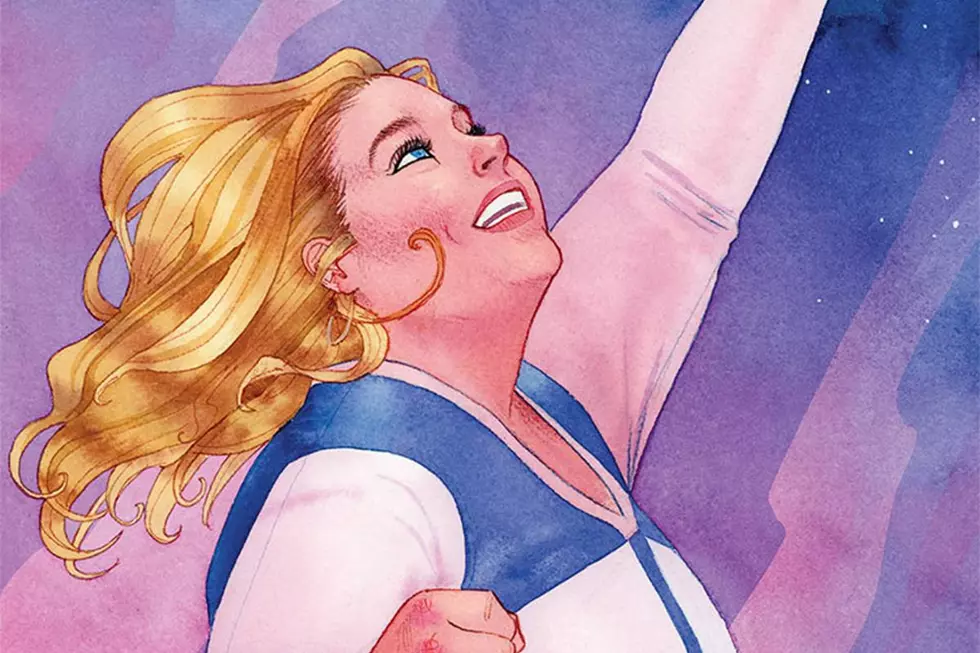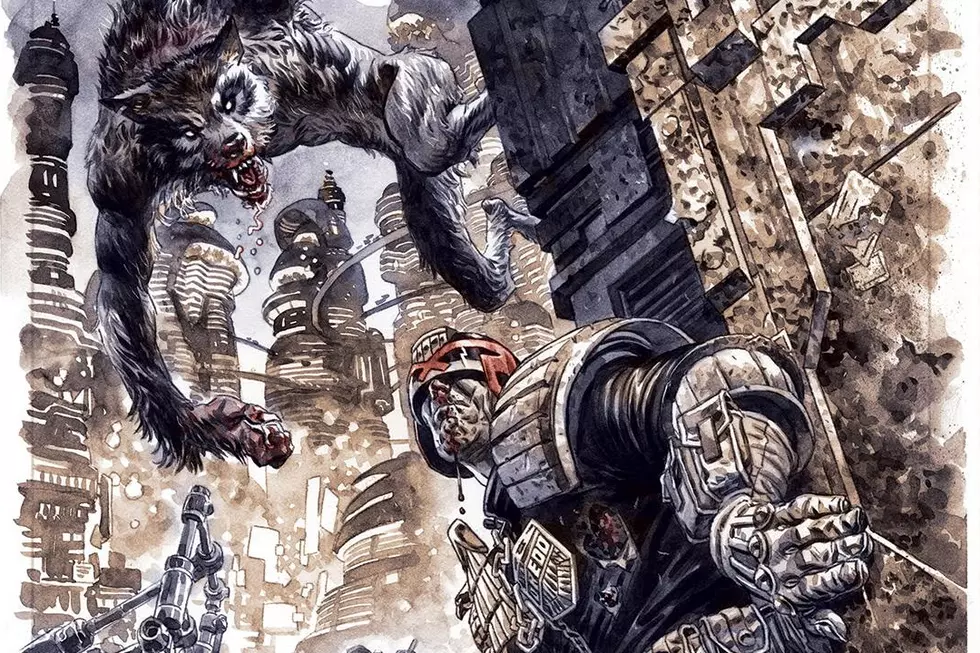![Duane Swierczynski On ‘Judge Dredd': ‘The Ultimate Police Procedural’ [Interview]](http://townsquare.media/site/622/files/2014/01/Dredd011.jpg?w=980&q=75)
Duane Swierczynski On ‘Judge Dredd': ‘The Ultimate Police Procedural’ [Interview]
If you're a new fan of the future's toughest cop, IDW's ongoing Judge Dredd series has provided a pretty great place to jump on. In their ongoing story, Duane Swierczynski and Nelson Daniel have given readers a crash course in Dredd's future-shocking world, taking readers on a dizzying tour through Mega City One as it's attacked by renegade robots, murderous clones and more.
Now, with Judge Death and his genocidal, otherwordly cronies waiting in the wings to pronounce a death sentence on the city, I talked to Sweirczynski about his history with the character, his approach to making such a strange and complicated world friendly to new readers (while keeping it decidedly unfriendly to the people who actually live there) and why Judge Dredd is a lot like ROM: Spaceknight.
ComicsAlliance: What's your history with Dredd as a character? Are you one of those guys who was hunting down back issues of 2000 AD when you were younger, or is it a more recent thing?
Duane Swierczynski: I first encountered Dredd in a friend's video game on his Commodore 64 (yes, I am that ancient). The very idea of Dredd -- wait, he's a Judge who goes around like a cop, sentencing people in the street? -- really appealed to my 15-year-old brain. (This is around the same time I first saw RoboCop, which I now realize was huge inspired by Dredd.) So yeah, after that I was feverishly searching for back issues of 2000 AD. The first Dredd-related comic I found, though, years later, was Judgment on Gotham, the first Dredd/Batman team-up. From then on I snapped whatever Dredd I could find.
CA: Was there a particular aspect of his character that got to you, or just the whole stony-faced package?
DS: To be honest, I think it was because Dredd reminded me of RoboCop, which was (and remains) my favorite movie. Only later did I realize that writers Ed Neumeier and Michael Miner were inspired by 2000 AD comics, as well as ROM: Spaceknight, when they were writing Robo.
CA: Did you have a favorite story aside from Judgment on Gotham, or was seeing Batman slugging Dredd in the face the crucial moment that got you?
DS: That was a beaut, wasn't it? The scene that comes to mind is Dredd interrogating Batman, and Bruce is pretty much holding his own -- despite being trapped in another reality. I love it when two hard-asses thrown down, and neither wants to give an inch.
CA: The interesting thing about your first arc of Judge Dredd is that it seems like you're going out of your way to introduce a lot of what makes Mega City One such a distinctive setting -- there's all that crazy, over-the-top sci-fi, and at one point Dredd even almost takes a tour through various blocks. Did you feel like that was something you had to do in order to catch the audience up?
DS: Absolutely. I try to make the setting in my comics (and especially my novels) a character, just as much as the ones moving around on two legs. Mega-City One is a fascinating place; if anything, I'm actually wondering if I did enough to establish things in that first arc.
CA: I think you pulled it off pretty well, but how did you approach that? There's so much about Mega City One that you get into over the course of that first arc, where it seems like it's designed as this grand tour. Did you sit down thinking "okay, I have to have the robots in there, the weird technology, and so on" or did that come naturally as you built the story?
DS: I'd say it evolved pretty naturally. I think I followed my instincts as a crime novelist -- setting is always important to me, whether the action takes place in Philadelphia or L.A. or Mega-City One. There was no checklist; instead I followed the story, which is basically: bad stuff is going down in this town, and there's only one man who can handle it. The fact that "bad stuff" includes genetically-altered fruit that attacks mall-goers or half-naked robots who turn on their owners is what makes it Mega-City One.
CA: Was there any kind of pressure -- just from yourself as a writer and a fan of the character -- to do something that would work for new readers?
DS: Chris Ryall and I definitely wanted to make this as new-reader-friendly as possible without alienating longtime fans. So the balance I struck in my mind was to tell new stories that would have extra resonance for those die-hard Dredd junkies -- stuff like the robot rebellion, and of course, the Cursed Earth saga. But hopefully people new to Dredd's special brand of justice found it easy to follow and fun without knowing those earlier stories.
CA: I was going to ask if you were intimidated at all in taking a shot at an American Dredd comic, but then I remembered that you picked up Immortal Iron Fist after Brubaker and Fraction, and were also one of the first guys to write a Punisher story after Garth Ennis left -- which, by the way, I love. How do you take on an assignment like that, where there's a lot of expectations from long-time fans?
DS: Yeah, I seem to be the clean-up guy, don't I? "A fan-favorite creator is leaving the book! Who do we send in? Ah, what the hell, give Swierczy a shot. He'll do anything." But truthfully, I won't take an assignment unless I'm a big fan of the character. And perversely, I think following folks like Brubaker, Fraction and Ennis (three of my favorite writers, by the way) gives me a strange kind of freedom. Readers know it won't be the same, so I feel like I'm free to do my own thing and hope people stay along for the ride.
CA: When I talked to Douglas Wolk, he mentioned that the IDW series is in a separate continuity from the core 2000 AD storyline. How was that decision made, and how much of the history of Dredd did you want to be able to use?
DS: At first I thought I'd tell stories kind of curled around existing continuity, but that felt too limiting. So I felt like 2000 AD provided me with these great characters, with this great city, and with this huge chunk of history... what do I want to do with it? I think of Dredd as the ultimate police procedural, and each arc is meant to have a different flavor: gritty urban noir in one, country noir/horror in another... And by the way, I've got a life-time supply of Munce for the eagle-eyed readers who spot all of the crime writer easter eggs I've been dropping into the series. (The in-joke I was dying to do since the beginning: "Lawrence Block Block.")
CA: The Dark Judges are coming up, and I'm curious as to whether you wanted to stay away from them for a while, or whether that was something you wanted to hit from the start of your run.
DS: Right from the beginning Chris Ryall and I started giggling like hyenas over the idea of doing a Dark Judges story, but we wanted to establish Dredd and the city first. Now seemed like the right time to bring them on stage.
CA: Not to spoil the upcoming story, but where do you go with a character like Judge Death, who's destroyed most of the city in the past, and how do you keep it as a procedural when you're dealing with interdimensional genocide?
DS: "Interdimensional genocide" -- I like that! Why, there oughta be a law...
Death and his cohorts have a strategy, which means Dredd is going to have to come up with a strategy of his own. It's not so much a whodunnit -- that's pretty clear from the beginning -- as it is "how the hell are we going to stop it?" Hopefully, the answer will shock and surprise. And it's cliche to say, "this changes things forever," but... well, things really are going to change radically.
More From ComicsAlliance
![Judge Dredd Takes On Fairlyhyperman In ‘The Cape & Cowl Crimes’ [Preview]](http://townsquare.media/site/622/files/2017/03/Dredd00.jpg?w=980&q=75)
![The Usual Suspects Get New Looks In IDW’s ‘Clue’ [ECCC ’17]](http://townsquare.media/site/622/files/2017/03/clue_featured.jpg?w=980&q=75)
![The Law Returns To The Moon In ‘Judge Dredd Annual 2017′ [Preview]](http://townsquare.media/site/622/files/2017/02/Dredd00.jpg?w=980&q=75)
![It’s High Steaks Action In ‘The Black Hood: Season Two’ #3 [Exclusive]](http://townsquare.media/site/622/files/2017/02/BlackHood00.jpg?w=980&q=75)


![The Best Dark Horse Comics Covers of 2016 [Gallery]](http://townsquare.media/site/622/files/2017/01/featured.png?w=980&q=75)


